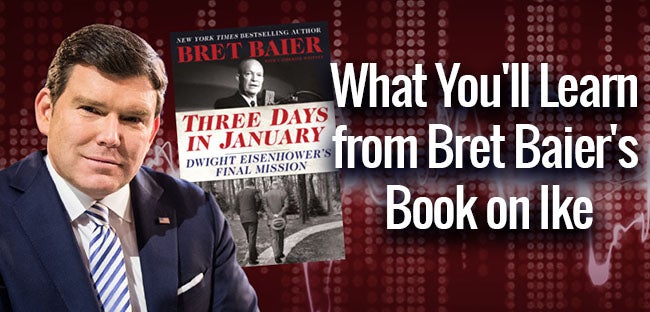RUSH: We had Bret Baier, I think a couple days before the inauguration, so the 18th, I think, Bret Baier was here, Fox News, Special Report. Bret Baier. He’s written a book that I think it debuted at number two on the New York Times, Three Days in January. It’s about the transition from Eisenhower to JFK, and a lot of history, a lot of biographical information about the Eisenhower presidency.
I asked Bret about it and he was surprised at some of the similarities he found when he researched this between Eisenhower and Trump. I’ve had a chance to dig into this, and presidential history and such things as what happens during transitions, things you don’t see, things that TV doesn’t show you, it’s really well done. It took Bret three years to research and write this book, what with everything else that he has on his plate, and it’s a serious, scholarly effort.
 It is really well done, and I just wanted to add an exclamation point to the interview that we did with him, ’cause he did a great job of explaining it and tying some of the events in his book to the Trump transition with Obama and into the day of the inauguration. But it goes beyond that. For example, you talk about bipartisan and people not getting along, Eisenhower and Truman despised each other.
It is really well done, and I just wanted to add an exclamation point to the interview that we did with him, ’cause he did a great job of explaining it and tying some of the events in his book to the Trump transition with Obama and into the day of the inauguration. But it goes beyond that. For example, you talk about bipartisan and people not getting along, Eisenhower and Truman despised each other.
For example, on the day of the inauguration, the tradition is that the new president shows up at the White House and goes in with his wife and has coffee or tea with the outgoing president and his wife and secret handshakes and secret letters and secret compartments and, you know, where the end of-the-world button really is, all that stuff is explained, the old president to the new. And they’re in there for 10 or 15, 20 minutes, and then they’re off to the inauguration.
Well, the car carrying Eisenhower and Mamie did indeed arrive at the White House, and Eisenhower didn’t get out. He never went in to have coffee or tea or learn where the secret end-of-the-world button is or any of these conspiracy handshake compartments are. He never went in there to learn any of this stuff. He waited for Eisenhower to come out and they drove over there. And they didn’t speak.
 And everybody thinks that back in that day it was filled with cooperation and comity, postwar boom and so forth. There’s all kinds of really fascinating, historical data that is in this book and many of you who were not even alive when it happened or very young and were too young to take note of it, if you have any interest in presidential history at all that is well related to present time, this is a great book. It is Bret Baier’s Three Days in January.
And everybody thinks that back in that day it was filled with cooperation and comity, postwar boom and so forth. There’s all kinds of really fascinating, historical data that is in this book and many of you who were not even alive when it happened or very young and were too young to take note of it, if you have any interest in presidential history at all that is well related to present time, this is a great book. It is Bret Baier’s Three Days in January.


